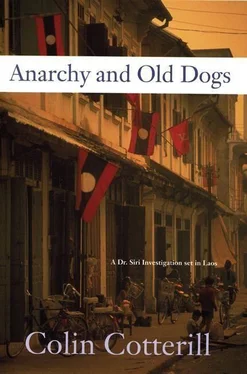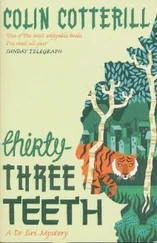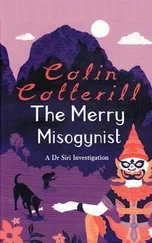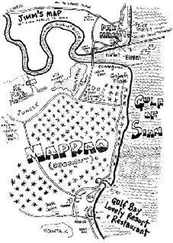Colin Cotterill - Anarchy and the Old Dogs
Здесь есть возможность читать онлайн «Colin Cotterill - Anarchy and the Old Dogs» весь текст электронной книги совершенно бесплатно (целиком полную версию без сокращений). В некоторых случаях можно слушать аудио, скачать через торрент в формате fb2 и присутствует краткое содержание. Жанр: Криминальный детектив, на английском языке. Описание произведения, (предисловие) а так же отзывы посетителей доступны на портале библиотеки ЛибКат.
- Название:Anarchy and the Old Dogs
- Автор:
- Жанр:
- Год:неизвестен
- ISBN:нет данных
- Рейтинг книги:3 / 5. Голосов: 1
-
Избранное:Добавить в избранное
- Отзывы:
-
Ваша оценка:
- 60
- 1
- 2
- 3
- 4
- 5
Anarchy and the Old Dogs: краткое содержание, описание и аннотация
Предлагаем к чтению аннотацию, описание, краткое содержание или предисловие (зависит от того, что написал сам автор книги «Anarchy and the Old Dogs»). Если вы не нашли необходимую информацию о книге — напишите в комментариях, мы постараемся отыскать её.
Anarchy and the Old Dogs — читать онлайн бесплатно полную книгу (весь текст) целиком
Ниже представлен текст книги, разбитый по страницам. Система сохранения места последней прочитанной страницы, позволяет с удобством читать онлайн бесплатно книгу «Anarchy and the Old Dogs», без необходимости каждый раз заново искать на чём Вы остановились. Поставьте закладку, и сможете в любой момент перейти на страницу, на которой закончили чтение.
Интервал:
Закладка:
They left the eerie round room, all but Siri. He found himself alone, following the procession of elephants with his eyes, incapable of turning away from them. He stood in the center of the room rotating slowly at first, then faster and faster, the elephants and their proletariat jockeys galloping around the room. The pelmet above the windows took on a life of its own. It became a naga -an unholy serpent. It curled down from the wall as Siri spun and wound itself slowly about him. It curled around his neck and he could do nothing. Tighter and tighter it squeezed until he could no longer catch his breath. He pulled at the thick scaly skin of his attacker but had no effect on it. He choked and gasped for air that wouldn’t come. He dropped to his knees and felt his skin pulling tight against his skull.
“What in hell’s name?” Civilai had come back to collect his comrade. “Siri?” He hurried to the center of the room and took hold of the blue-faced doctor. Siri’s hands were clawing at his neck.
“Get it off,” he wheezed.
“What?”
“The…” Siri blinked and looked around him. His breath slowly returned to normal and the dizziness cleared. Once he was in control, he smiled and looked at his friend. “The naga,” he said.
“You’re seeing naga?”
“Yes, but it started with pink elephants.” He laughed and used Civilai to help himself to his feet.
“Brother, if I had hangovers like yours I wouldn’t touch another drop. That l promise you. Are you all right?”
“Fine. Just feeling a bit peculiar. It’s this room.”
“I know. I felt it, too.”
“You did?”
“Bad paintings always make me nauseous.” “They are awful, aren’t they?”
Siri let it go at that and led Civilai to believe he’d had an attack of vertigo from the five-story climb. But he knew the feeling only too well. The Phibob had cornered him without his talisman and, if he’d been alone, they might very well have suffocated him. They had the ability to bluff him to death. He was exposed. His evening hairdresser’s appointment couldn’t come too soon.
“They took away my livelihood, just like that,” Phosy said.
He was sitting cross-legged in a circle of ten men. It was a common enough sight, old hands at the camp latching on to the newcomers, getting the latest gossip from back home. They drank Thai rum from mismatched glasses and waited for their food.
Dtui, being a woman and a wife, was with the other wives at the back of the meeting shelter cooking the food. The women drank, too, but their conversation was about babies and hair and the cost of washing powder, and then more babies.
“So, Dtui, you and Phosy haven’t managed to get around to it?”
“No,” she said. “You know how it is. Phosy always said he wanted us to be secure, know what I mean? Be sure our kids could go to school and get a decent education.”
“Right,” said one woman whose skin was like tree bark. She had a cheroot hanging out of her mouth and the ash dropped onto the cabbage she was deleafing. It wasn’t easy to catch her words. “And you believe that shit?”
“What do you mean?” Dtui said. She wiped the onion tears from her eyes.
“Are you sure he’s not just using that as an excuse is what I mean. An excuse not to have kids.”
“Why would he?”
“Easier to run away from a woman that’s by herself than from one with a couple of babes in arms.”
“Leave her alone, Keo,” said a pretty chicken chopper.
But Dtui was on the defensive. “My Phosy’s a good man,” she said. “A decent man…”
“He wouldn’t ever leave me,” Keo said, aping Dtui. This drew laughter from the other members of the lunch detail. “Right. I’ve heard that one before.”
“You don’t know him,” Dtui said, indignant now. “He’s not like other men.”
The sound of women’s laughter interrupted the man talk and caused a few smiles in the front room.
“They’re never happier than when they’re together cooking,” opined the senior section representative, Bunteuk. He was a good deal younger than Phosy. But America’s President Carter’s recent attack of guilty benevolence had led to the making of an agreement to accept a large number of displaced Lao, his former allies, into the United States. This had emptied the camps of many of their longer-term residents and forced younger men into positions of responsibility. Bunteuk had moved up several notches and was now expected to share his wisdom. Phosy smiled at the thought of Dtui in the kitchen discussing vegetables. She’d help serve the men soon, then retire to the back room to wash the dishes.
That’ll teach her, he thought.
The camp was a lively place. Thai vendors plied their wares in an attempt to relieve the refugees of the last of their savings or the few dollars they earned by working part-time for the aid agencies. Bored Lao with nothing else to do strolled here and there, chatting, staring, puffing out their cheeks. The International Refugee Committee sanitation trucks kicked up the dust and panicked chickens. Ubon residents with children at their sides wandered up and down the regimented lanes of wooden shacks whispering warnings. “These people are from Laos, darling. This is what communism does to you. Never forget it.”
Westerners with lists and large sweat stains under their armpits hurried somewhere, always flustered and muttering. The churches and the nongovernment organizations had coordinated their efforts to some extent and created a semblance of order in the Ubon camp. The latrines were sanitary for most of the year, there was always plenty of rice, and a hierarchy of order-from camp liaison officers down to area and street representatives-kept lawlessness to a minimum.
Money arrived from time to time from relatives who’d already made it to Australia or Europe or the United States, where they were working three shifts cleaning offices or scrubbing grease from Italian casserole dishes through the night to earn enough to restart their lives. For some camp dwellers this pocket money meant a splash of luxury: a bottle of whisky every now and then, an ice cream for the kids, an incentive to the evening guards to allow a visit to the nightspots of Ubon. There were certainly worse places than this old U.S. Army weapons dump in which to be displaced. But even though you could get used to being there, you could never belong. And it was belonging that the refugees at the Ubon camp desperately craved.
Phosy stretched out his well-fed body in front of the open-air meeting shelter of Section 36. He liked his neighbors. The men had warmed to him. The most difficult part-settling in, being accepted-had been taken care of on this, the first day.
All he needed now was to keep his ear to the ground and discover how he might get an introduction to the inner core. He already had an idea. He sidled over to Bunteuk and stood beside him, looking up at the ripe clouds.
“More rain?” he asked.
“Looks like it,” said Bunteuk. “You’ll hate it when the rainy season sets in proper. This place turns into chocolate mousse, mud up to your knees. All your bedding turns to mildew.”
“You sound like you’ve been here a while.”
“Eighteen months next week.”
“You don’t say? How come you didn’t get on the bus with the last batch of refugees to the U.S.? I hear they took most of the old-timers.”
“Yeah, they did. Not that easy, though. They did offer us a place but we have to get things settled over there: jobs, community, place to stay. You see, we haven’t got family in America to take us in. I’ve heard of new arrivals starving to death on the street, getting killed by gangs-horrible stuff. I don’t want that for my children. I’m waiting for a placement to Australia. It should come this year. I know people there; it’s safer.”
Читать дальшеИнтервал:
Закладка:
Похожие книги на «Anarchy and the Old Dogs»
Представляем Вашему вниманию похожие книги на «Anarchy and the Old Dogs» списком для выбора. Мы отобрали схожую по названию и смыслу литературу в надежде предоставить читателям больше вариантов отыскать новые, интересные, ещё непрочитанные произведения.
Обсуждение, отзывы о книге «Anarchy and the Old Dogs» и просто собственные мнения читателей. Оставьте ваши комментарии, напишите, что Вы думаете о произведении, его смысле или главных героях. Укажите что конкретно понравилось, а что нет, и почему Вы так считаете.












